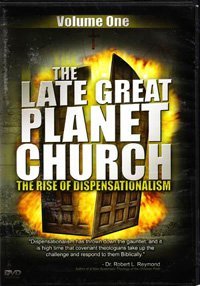 I am no authority on eschatology, on the theology of the end times. In fact, I need all the help I can get in understanding it and in separating one view from the next. It is an area where seemingly small distinctions can make profound differences and where tensions often run high. It was with some interest, then, that I turned to The Late Great Planet Church, a new documentary by NiceneCouncil. It is hosted and produced by Jerry Johnson who has been part of the team behind other such excellent documentaries as Amazing Grace: The History and Theology of Calvinism.
I am no authority on eschatology, on the theology of the end times. In fact, I need all the help I can get in understanding it and in separating one view from the next. It is an area where seemingly small distinctions can make profound differences and where tensions often run high. It was with some interest, then, that I turned to The Late Great Planet Church, a new documentary by NiceneCouncil. It is hosted and produced by Jerry Johnson who has been part of the team behind other such excellent documentaries as Amazing Grace: The History and Theology of Calvinism.
Like most similar documentaries, this one relies on interviews with pastors and scholars. In this case the list of contributors includes Kenneth Gentry, Kenneth Talbot, Tom Ascol, Tom Nettles, Gary DeMar and several other notable teachers or scholars. Several of those who contribute to this production are former dispensationalists themselves and they are able to provide an personal, inside perspective on the issues inherent in the system that ultimately drove them away from it. Often this is little more than their growth in Christian maturity; as they searched the Scriptures they found, quite simply, that dispensational theology was nowhere to be found in God’s Word.
I will say up-front that, for this DVD, the information is better than the production. The production quality, though by no means terrible, is also not excellent. The audio is not great and the levels sometimes vary from segment-to-segment. There are also some background graphics which, at least to my untrained eye, appear to be stock videos that are low-quality and thus appear quite pixelated and stutter at times. Even the lighting is uneven so the faces of the people being interviewed are unevenly lit. None of these are major problems, but I feel they do merit a mention. Thankfully the information conveyed is very good and overshadows the somewhat-amateurish production quality.
This is but volume one of what is going to be a two-volume set, so Johnson does not set out to provide a complete rebuttal to dispensational theology. Instead, in this first volume he focuses on the rise of dispensationalism, looking to its roots and its earliest proponents. In the second volume he will compare dispensationalism to Scripture but here he simply allows the earliest teachers to speak for themselves. And if you know the history of this theology, you know that these men do great damage through their words and through their lives. There is Darby with his disregard for the history of the faith and his almost-prideful admission that this theology was unknown until he discovered it. There is his out-of-control ego which led him to separate from many other believers and eventually to conclude that his church was the only true church in all of London. Spurgeon’s reaction to Darby and his Plymouth Brethren is instructive as the perspective of a wise and godly contemporary. And then there is Scofield who, even as a professed Christian, utterly abandoned his wife and two daughters, immediately remarried and then assigned to himself the title of doctor even though he had educated himself. While granting that such men, with their unbiblical behavior, do not discount the theology, Johnson feels that he cannot tell the story of dispensational theology without providing these simple facts from the lives of its founders. And he is right, I think, to do so. Truly the roots of this theology are surprising and shocking, even. He looks also to some of the theology these men taught, showing how even their followers had to downplay or deny some of what was so utterly unbiblical (such as the view that God’s means of salvation in the Old Testament was different from the means of salvation today).
This is a valuable DVD, I think, and one that may well serve to encourage some of the people who have been reared in this system to think deeply about their beliefs. As an introduction, this first volume does its job well. I will wait eagerly for the second volume to see how Johnson and his team of scholars apply Scripture to dispensationalism and provide what I expect will be a thorough rebuttal.
(And if you have not yet done so, be sure to take a look at Amazing Grace: The History and Theology of Calvinism)










